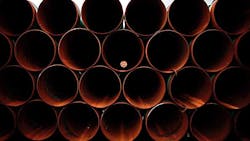Congress Approves Keystone Pipeline, Veto Looms
WASHINGTON - Congress scored its most significant legislative achievement of 2015 Wednesday, approving the controversial Keystone XL pipeline to transport Canadian oil to U.S. refineries, though President Barack Obama plans to veto it.
The pipeline, mired in years of congressional tussles, had run into criticism from environmentalists concerned over the crude that would be transported from Alberta's oil sands, as well as approval delays by the Obama administration.
After numerous Republican attempts to force Obama's hand on the project, the Senate passed its version of the bill last month with bipartisan support.
The House followed suit Wednesday with a vote of 270 to 152 sending the bill to the president's desk. Twenty-nine Democrats joined all but one Republican, Michigan's Justin Amash, in backing the measure.
"It's way past time to say yes," Republican Mike Kelly of Pennsylvania said on the House floor.
Should the bill become law, it would override the extended review process and ram through authorization, allowing builder TransCanada to get to work on the 1,179-mile (1,900-kilometer) pipeline that Republicans insist is a job generator that boosts U.S. energy security.
With Keystone likely in limbo after congressional passage, House Speaker John Boehner reiterated his charge that Obama was hindering job creation.
"The president is standing with a bunch of left-fringe extremists and anarchists," Boehner told reporters.
House Republican Cynthia Lummis, of Wyoming, described Obama's veto threat as "beyond rational explanation" and urged the president to reconsider.
Benefits to U.S.?
The project has already proved divisive this year. Republicans made Keystone their top priority after winning full control of Congress in November's election, citing a State Department review that concluded the pipeline would generate some 42,000 construction jobs.
Many Democrats have several objections: they say oil sands produce "dirty" crude that takes more energy and water to extract and refine than conventional crude; the project is a nod to a foreign company; and just 35 of the Keystone jobs will be permanent.
"And in the end, the refined oil coming in from Canada will not benefit the American economy" as most of it would be exported, Senate Democrat Dick Durbin said.
Various government departments have been reviewing the project to see if it would be in the U.S. "national interest."
In mid-2013, Obama said such interest would be served "only if this project does not significantly exacerbate the problem of carbon pollution."
The State Department, in its environmental impact assessment of January 2014, determined that Keystone would not likely alter overall greenhouse gas emissions.
Republicans argue that moving oil by pipeline releases far fewer emissions than transporting it by rail or road.
In December, Obama explained part of his opposition to the pipeline, saying it would be "very good for Canadian oil companies... but it's not going to be a huge benefit to U.S. consumers."
The Sierra Club slammed the bill's passage, with the conservation group's executive director Michael Brune saying, Republicans put forth "a show of unflinching loyalty to their Big Oil campaign donors who put this tar sands pipeline at the top of their wish list."
Copyright Agence France-Presse, 2015
About the Author
Agence France-Presse
Copyright Agence France-Presse, 2002-2025. AFP text, photos, graphics and logos shall not be reproduced, published, broadcast, rewritten for broadcast or publication or redistributed directly or indirectly in any medium. AFP shall not be held liable for any delays, inaccuracies, errors or omissions in any AFP content, or for any actions taken in consequence.
